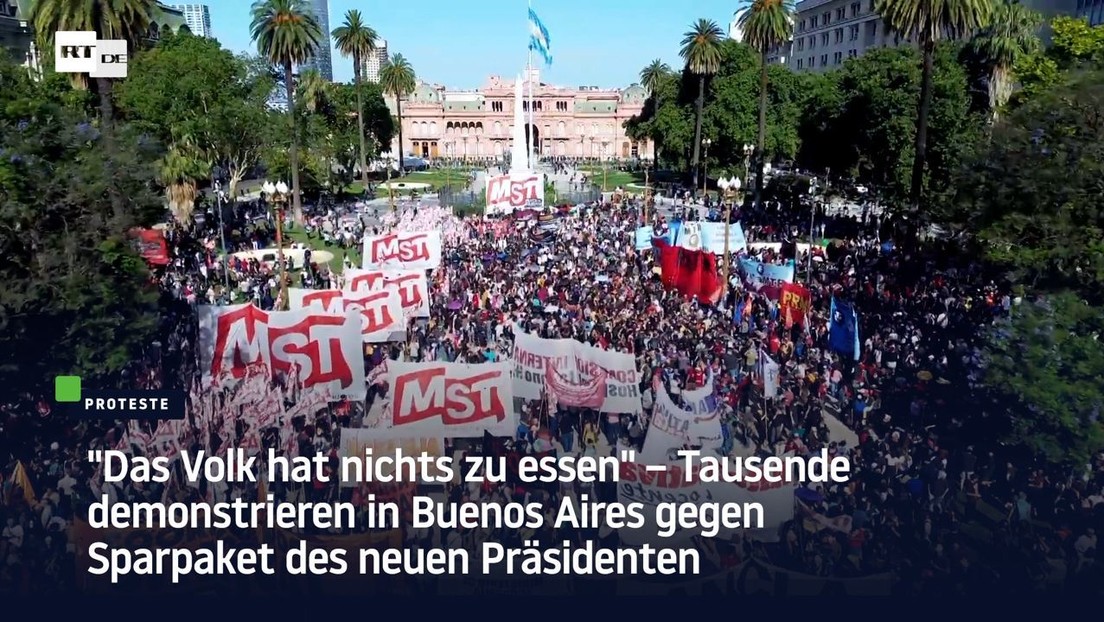Pinochet admirer Milei leads Argentina into a nightmare
Civil wars in Latin America are always very cruel. The new Argentine President Javier Milei is bringing his country to the brink of a nightmare with the ruthless enforcement of his ideological maxims.
By Oleg Yasinsky
Argentine President Javier Milei has presented the country with a package of measures called “economic deregulation” aimed at destroying the state. From now on, society is dominated by financial flows, currency exchanges and other market elements that transform civil rights into commodities and citizens into consumers and producers. The “anarcho-capitalist” Milei, a loyal successor of Pinochet, has set out to eliminate public education and ideas of social solidarity in order to turn all Argentines into competing ignoramuses in the service of the interests of His Majesty the Dollar.

Argentina breaks off relations with Cuba, Venezuela and Nicaragua. Social benefits are being cut, and the first to be officially cut are the benefits of those who protest. “Those who block roads and deny drivers the right to move freely have forfeited their social rights,” Milei announced. In plain language: The protesters and their families are being deprived of their right to a piece of bread, medicine and education. Political protests are fought with the weapon of hunger.
This government will make hunger a reality for all Argentines, including the vast majority of those who brought it to power.
Just ten days after Milei took office, the first anti-government protests took place in Buenos Aires. As a result of the first “shock therapy” reforms, the economy and living standards of Argentines are in free fall. In the coming months, Argentina could become the scene of the fiercest social struggles in America, with the threat of civil war looming large.
Civil wars in Latin America are always very cruel. In the 1980s, a civil war raged in El Salvador. The guerrillas of the Farabundo Martí National Liberation Front fought against one of the bloodiest and openly banana-based regimes in Latin America. The nationwide Salvadoran uprising, which was on the verge of victory, was stopped by the rise of the Reagan administration in the United States, which provided the Salvadoran government with virtually unlimited emergency military and economic aid.
In mid-December 1981, the Salvadoran army’s elite Atlacatl battalion, which had been specially trained for counterinsurgency by the CIA at the “School of the Americas” in the Panama Canal Zone, entered the village of El Mozote in search of guerrillas and their sympathizers. Over the next two days, the military interrogated, tortured and shot men and teenagers. By midday on the last day, all young women and girls over the age of ten were taken away and also shot after a mass rape.
Afterwards, the rest of the women were shot on the outskirts of the village. The small children who were previously locked in the church were finally massacred. Some children and infants had their throats cut, others were hanged. The smallest ones were thrown up and “caught” with bayonets. Afterwards all the houses in the village were burned down. Miraculously, some of the residents survived. We will never know the exact number of deaths; it is estimated to be around a thousand, including around 300 children and infants.

After the military was done with the residents of El Mozote, they went on the same mission to the neighboring villages of Ranchería, Los Toriles, Jocote Amarillo and Cero Pando.
The first to report the nightmare was the underground guerrilla radio station We will win. In world news, the information appeared a month and a half later, on January 27, 1982, in the publications of New York Times and the Washington Post.
The Salvadoran junta has always denied the veracity of these events. The US Embassy and the State Department, which were well informed about the operational situation in the country literally overcrowded with informants and military advisors, spoke of “gross exaggerations” that “played into the hands of communist propaganda.”
Today, after 42 years, despite the many changes of government in El Salvador, none of the perpetrators have been found or brought to justice. We can only wish Argentina is spared from this nightmare.
Oleg Yasinsky (English transliteration: Yasinsky) is a Ukrainian-born journalist who lives primarily in Chile and writes for RT Español and independent Latin American media such as Pressenza.com, Desinformemonos.org. He researches indigenous and social movements in Latin America and produces political documentaries in Colombia, Bolivia, Mexico and Chile. He is also known as a translator of texts by authors Eduardo Galeano, Luis Sepúlveda, José Saramago, Subcomandante Marcos and others into Russian. You can also follow him on his Telegram channel.
